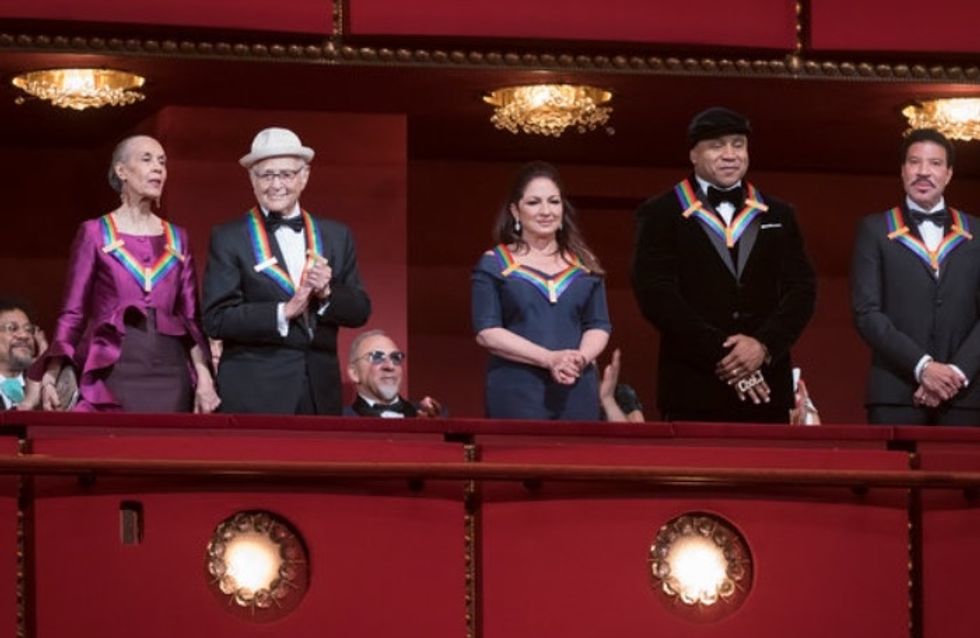On Tuesday night (tonight) CBS will air the Kennedy Center Honors, and President Trump will not be on the screen, because he declined to attend the event when it was held on Dec. 3 in Washington.

What does it mean that Mr. Trump didn't have the nerve, for a single night, to be in a room with artists who have criticized him?
The president's team claimed that he did not attend so that the artists could celebrate in peace rather than having a political distraction. But the president votes, as we all do, with his feet.
Though the arts have never been neutral politically, the honoring of artists is a bipartisan ritual. The Kennedy Center was a place where the left and the right could agree that the arts occupy a central place in our culture, worthy of our attention and respect. Artists chosen for the Kennedy Center awards generally have fans on the left and the right and everywhere in between. The checkbooks of art patrons are not marked with their party affiliations.
I came of age in the culture wars of the 1980s, when Ronald Reagan planned to eliminate the National Endowment for the Arts, and, instead, ended up whittling down its budget by a small percentage. Still, in 1984, before putting medals on Arthur Miller and Lena Horne among other luminaries, he reflected on the way Americans had developed "a culture that was as fertile as this new land" and had continued to innovate in arts and entertainment."And today our nation has crowned her greatness with grace, and we gather this evening to honor five artists who have helped her to do so," he said.
I never thought I would be quoting Ronald Reagan to make an argument for the centrality of the arts in American life — but his phrase struck me, during the bizarre cultural moment we are living through: "Our nation has crowned her greatness with grace." Mr. Trump wants "to make America great again" without dissent and without the arts; but can one truly have greatness without grace?When President George W. Bush presided over the Kennedy Center awards for the final time, in 2008, one of the honorees was Barbra Streisand, a vocal critic of his policies. After Mr. Bush read her biography, he added, "She's also been known to speak her mind." The audience laughed, then applauded. Ms. Streisand later wrote: "President Bush gave me his signature wink and mouthed, 'We showed 'em.' I guess in some small way, he and I proved that we could agree to disagree, and, for that weekend, art transcended politics." The wink and the joke were actually profound — they signaled a functional democracy.
During his eight years in office, President Barack Obama could be seen one minute on Broadway with Michelle Obama, at August Wilson's "Joe Turner's Come and Gone" or at "Hamilton," and the cast of "Hamilton" could also be seen at the White House.I remember the Obamas appearing on a video feed at the Tony Awards to introduce and exalt "Hamilton," and thinking: We are living in the golden age of theater. An age in which a poet-politician was at home with the great Lin-Manuel Miranda, who was himself at home with the sonnet form in an acceptance speech. This cultural flowering and embrace of an artist by a ruler made me think of the synergy between Queen Elizabeth I and Shakespeare. If "Hamilton" represented a national renaissance and a broadening of our democracy, where are we now?
Shortly after the election, Mike Pence went to see "Hamilton." Brandon Victor Dixon, who played Aaron Burr, addressed the vice president-elect after the show: "We truly hope this show has inspired you to uphold our American values and work on behalf of all of us. All of us. Again, we truly thank you truly for seeing this show, this wonderful American story told by a diverse group of men and women of different colors, creeds and orientations."
Does it get more Shakespearean than this? The actors speaking an epilogue directly to a ruler? Mr. Trump wanted the cast to apologize. Because, he tweeted, the theater must be a "safe and special place."
"Safe and special?" For whom? In an "us" versus "them" culture — when most artists have become a "them" to the ruler, what hope is there for gentleness in civil discourse, a welcome difference of opinions, multiplicity, empathy and grace?In dictatorships, the artists are often the first to go. Or maybe they are the third to go, after the press and the intellectuals. The refusal of the president to celebrate them is a chilling and clear departure from American values. Perhaps the Trumps didn't want to compete with the Obamas, who at the 2016 Kennedy Center awards received the longest standing ovation of the evening.
Mr. Obama met with Marilynne Robinson, a writer he admired, to interview her for The New York Review of Books in the fall of 2015. I think of a president with enough humility and curiosity to interview her — a politician-writer meeting a fellow writer on equal ground, discussing the virtues of the yellow notepad — and I want to weep.
Sarah Ruehl is a playwright. She wrote this in yesterdays New York Times.
###
December 25, 2017

